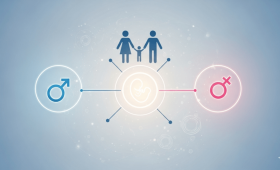Introduction: IVF and Gender Selection in Japan
Today, advancements in medical technology are opening new doors for couples who want to have children. In Vitro Fertilization (IVF) offers a promising solution for individuals with infertility issues. However, gender selection, considered a part of this process, brings with it legal and ethical debates in many countries. In this article, we will examine in detail the IVF treatment processes in Japan and the country’s legal and ethical stance on gender selection. We will also discuss why Turkey might be an attractive alternative for couples on this journey. Our goal is to provide you with a comprehensive guide to help you make an informed decision.
Overview of IVF Treatment in Japan
Japan is known for its high-tech healthcare sector and specialized clinics. IVF treatment is a widely used method in the country. However, the approach to IVF treatment in Japan generally focuses on solving the problem of couples being unable to have children. Treatment processes are carried out with meticulous protocols and high-standard hygiene rules. Many clinics in Japan offer personalized treatment plans tailored to individual patient needs and follow the latest technological developments in the field.
Legal Framework: Is Gender Selection Legal in Japan?
Gender selection is a very restricted area in Japan. The country’s laws prohibit the selection of an embryo’s sex outside of medical necessity. This prohibition is based on ethical concerns that gender selection is unethical and could disrupt social balances. Gender selection is only permitted under specific conditions to prevent the transmission of genetic diseases (e.g., gender-linked inherited diseases like hemophilia). This makes Japan an unsuitable option for couples who have a gender preference for family planning.
Medical Ethics and Guidelines
The medical community in Japan has very strict ethical rules regarding gender selection. Professional organizations like the Japan Society of Obstetrics and Gynecology (JSOG) set the guidelines on this matter. These guidelines clearly define the circumstances under which doctors and clinics can perform gender selection. Generally, gender selection can only be carried out using Preimplantation Genetic Diagnosis (PGT) to prevent the transmission of serious genetic diseases. Requests made for non-medical reasons are considered unethical and are rejected.
IVF Success Rates in Japan
IVF success rates in Japan vary depending on the clinics and the individual circumstances of the patients. Generally, clinics in the country achieve successful results at international standards thanks to their high-tech infrastructure. However, success rates vary depending on the woman’s age, the cause of infertility, and the treatment protocol used. Success rates are higher for patients in a younger age group, while these rates may decrease in advanced ages. It is important for couples to carefully examine the clinics’ own success statistics before starting treatment.

Treatment Costs: How Much in Japan?
The cost of IVF treatment in Japan is quite high. The cost of a full IVF cycle can vary depending on the medications used, additional treatments, and clinic fees. Costs can generally range from 500,000 Yen (approximately 3,500 USD) to 1,000,000 Yen (approximately 7,000 USD), and these figures may not include additional services like Preimplantation Genetic Diagnosis (PGT). The high cost of living and healthcare prices make Japan an expensive destination in this area.
The Process: Step-by-Step IVF Treatment
The IVF treatment process in Japan is similar to protocols in other countries. This process generally includes the following steps:
- Initial Assessment: The couple’s medical history and causes of infertility are evaluated.
- Ovarian Stimulation: The woman is given hormone medications to produce multiple eggs.
- Egg Retrieval: The matured eggs are collected with a minor surgical procedure.
- Fertilization: The collected eggs are fertilized with sperm in a laboratory environment.
- Embryo Development: The development of the fertilized eggs (embryos) is monitored for a few days.
- Embryo Transfer: The healthiest embryo/s are transferred into the uterus.
- Pregnancy Test: A pregnancy test is performed approximately two weeks after the transfer.
Hormone Treatments and Egg Retrieval
An important stage of IVF treatment in Japan is the stimulation of the ovaries. The hormone medications used in this process aim to increase the number and quality of eggs. Medication dosages are adjusted based on the patient’s response. When the eggs are mature, egg retrieval is performed with a minimally invasive procedure guided by a vaginal ultrasound. This procedure is usually done under anesthesia, and the patient can be discharged the same day.
Embryo Development and Transfer
Fertilized eggs continue their development in special culture media in the laboratory. Embryologists closely monitor the quality and development rate of the embryos. Generally, one or two of the highest quality embryos are selected for transfer into the uterus. The embryo transfer is a painless and quick procedure. At this stage, it is recommended that the patient rests and avoids stress.
What is Preimplantation Genetic Diagnosis (PGT)?
Preimplantation Genetic Diagnosis (PGT) is the genetic screening of embryos before they are transferred to the uterus. This method is used to detect chromosomal abnormalities or specific genetic diseases in embryos. It includes subtypes such as PGT-A (aneuploidy screening), PGT-M (monogenic/single-gene disease screening), and PGT-SR (structural rearrangement screening).
The Role of PGT in Gender Selection
The genetic screening capability of PGT can also determine the sex of the embryo. However, due to legal and ethical restrictions in Japan, this feature of PGT can only be used to prevent the transmission of gender-linked inherited genetic diseases (e.g., Duchenne Muscular Dystrophy). For example, if a genetic disease that affects male children runs in a family, only female embryos may be permitted for transfer. Gender selection for family preference is strictly prohibited.
Who Can Access PGT in Japan?
PGT is not a method accessible to everyone in Japan. Access is subject to strict criteria and is generally limited to couples who have:
- Experienced recurrent pregnancy loss.
- Had repeated implantation failures.
- Structural abnormalities such as chromosomal translocations.
- Carriers of gender-linked genetic diseases. These restrictions pose a significant barrier for international patients seeking gender selection in Japan.

IVF Treatment for Foreigners
Japan offers IVF treatment for international patients. However, this process can come with some difficulties. You may need to make multiple visits to Japan before starting treatment. Visa procedures, travel, and accommodation expenses increase the logistical burden of the treatment process. Additionally, the Japanese healthcare system can be complex for foreigners.
Language Barriers and Translation Services
One of the most common difficulties for foreign patients considering IVF treatment in Japan is the language barrier. Although many clinics offer English-speaking staff or translation services for international patients, the quality and accessibility of these services can vary. The accurate translation of medical terms is critically important for the safety and success of the treatment process.
Choosing a Clinic and Doctor in Japan
When choosing a clinic and doctor for IVF treatment in Japan, you should be careful. Factors such as success rates, services offered, technological infrastructure, and patient reviews should be considered. However, it can be difficult for foreign patients to obtain this information and make a reliable choice. Also, since clinics in Japan have strict rules regarding gender selection, you must be aware that your requests on this matter will not be accepted.
Waiting Times and Appointment Management
Some popular IVF clinics in Japan may have long waiting times due to high demand. Even for the first appointment, you may have to wait for weeks or even months. Appointments and follow-ups throughout the treatment process must be meticulously planned. This can create flexibility issues for patients coming from abroad and can indirectly increase treatment costs.
Financial Support and Insurance Coverage
In Japan, IVF treatment can be partially covered by state insurance under certain conditions. However, this coverage is generally limited to Japanese citizens or individuals with legal residency in Japan. Foreign patients usually have to cover the entire treatment cost out of their own pockets. International insurance plans rarely cover fertility treatments like IVF.
Psychological Aspects of IVF Treatment
IVF treatment can be a physically and psychologically challenging process. Hormone treatments, uncertainties, and emotional ups and downs can create significant stress for couples. While most clinics in Japan offer psychological support services, foreign patients may not be able to fully benefit from these services due to language and cultural differences. This can make the treatment process even more exhausting.
The Concept of Family and Children in Japanese Culture
In Japanese culture, great importance is attached to family and having children. However, this cultural context can also create social pressure on couples who are unable to have children. Topics like gender selection are handled sensitively as they can conflict with traditional family values and societal norms.
Japan as a Medical Tourism Destination
Although Japan offers high-standard medical services, it does not stand out as a medical tourism hub, especially due to its strict rules on matters like IVF and gender selection. The flexibility and legal suitability sought by patients who want gender selection are not available. This leads foreign patients to look for alternative destinations.
Why Should You Consider Turkey? Legal Differences
In contrast to the restrictions in Japan, gender selection is legally possible under certain conditions in Turkey. In Turkey, gender selection can be performed for medical reasons, such as carrying a genetic disease or having a history of pregnancy loss. This legal flexibility makes Turkey an attractive option for couples with a family history of genetic diseases or a gender preference for family planning.
IVF and Gender Selection in Turkey
IVF treatment in Turkey is offered by modern clinics with high success rates and doctors specialized in the field. Gender selection is carried out by examining the sex chromosomes of the embryo through genetic tests (PGT). This process is conducted in accordance with international standards and under strict ethical supervision. The number of international patients coming to Turkey for gender selection is increasing every day.
Turkey’s Advantages: Cost and Accessibility
Turkey is a much more affordable alternative to Japan in terms of IVF treatment costs. The total cost of treatment can generally be less than 50% of the cost in Japan. In addition to the lower cost, clinics in Turkey offer special packages and services for international patients to make the process easier. Travel and accommodation costs are also at more reasonable levels. The language barrier can be easily overcome thanks to the widespread availability of English-speaking staff and translation services.
Clinics and Success Rates in Turkey
IVF clinics in Turkey provide services at world-class standards. Many clinics have international accreditations and use the latest technology. Although success rates vary depending on the woman’s age and the cause of infertility, they are generally at a level that can compete with rates in Japan and other developed countries. Turkish clinics are known for their patient-centered approach and personalized treatment plans.
Conclusion: A Comprehensive Guide to Making the Right Decision
While Japan offers high standards in IVF treatment, it is not a suitable place for those seeking gender selection due to legal and ethical restrictions. Turkey, on the other hand, provides a significant alternative in this area with both its legal flexibility and more affordable costs. For couples who want to receive quality healthcare at a lower cost and with legal assurance, Turkey can be the right address.
We advise you to consult with experts to get more information on this topic and to learn about the clinics and treatment options in Turkey. Remember, it is possible to achieve your dreams with the right information and the right steps.



